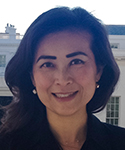 Sau khi ra trường, Elizabeth làm việc cho Hội đồng An ninh Quốc gia (National Security Council hay NSC), và từng trải qua chức vụ Giám đốc về Đông Nam Á vụ, Giám đốc về Đe doạ Toàn cầu, và từ 2013 làm Giám đốc về Đông Nam Á – Đại Dương Sự Vụ (Southeast Asia and Oceania Affairs).
Sau khi ra trường, Elizabeth làm việc cho Hội đồng An ninh Quốc gia (National Security Council hay NSC), và từng trải qua chức vụ Giám đốc về Đông Nam Á vụ, Giám đốc về Đe doạ Toàn cầu, và từ 2013 làm Giám đốc về Đông Nam Á – Đại Dương Sự Vụ (Southeast Asia and Oceania Affairs).
Elizabeth tháp tùng Tổng thống Obama về Mã Lai dự hội nghị Châu Á Thái Bình Dương (20 tháng 11, 2015. Ba năm sau ngày “giải phóng”, Elizabeth cùng ba má cô vượt biên và đến Mã Lai. Trước 1975, ba cô từng làm việc cho sở Mỹ và sau đó bị đi tù cải tạo một thời gian. Ra tù cải tạo, gia đình lâm vào tình cảnh bế tắc, thế là gia đình quyết định vượt biên. Trong một chuyến hải hành đầy gian nan trên một chiếc thuyền với 253 người, nhưng cuối cùng thì cũng đến trại tỵ nạn Mã Lai. Lúc đó, Elizabeth kể, cô chỉ mới biết đi chập chững nhưng cũng có nhiều kỷ niệm trong trại tỵ nạn.
Đến Mỹ, cả gia đình làm lại cuộc đời và thành công. Ba cô làm cho một công ty tài chính, mẹ thì làm y tá và nuôi con. Còn Elizabeth thì sau này theo học ở UC Berkeley về chính trị học (Political Sciences), rồi tiếp tục theo học Masters về ngành Quan Hệ Quốc Tế (International Relations) tại UC San Diego, và Trường Eisenhower thuộc National Defense University.
Ảnh Báo Elizabeth Phu UC San Diego http://gps.ucsd.edu/
Các bạn có thể đọc toàn bài ở đây :http://www.latimes.com/…/la-fg-obama-aide-refugees-20151120…
Theo: Anle20
Ảnh Báo Elizabeth Phu UC San Diego http://gps.ucsd.edu/
Nov. 5, 2014 By Anthony King | GPS News
 What was your initial reason for choosing the School?
What was your initial reason for choosing the School?
Elizabeth Phu: I wanted a school that one, required me to study a language and two, I wanted a school that was strong on Southeast Asia. The language was particularly important to me because I had been advised that your credibility when working in any international arena really depended on whether or not you could speak the language of your region of expertise. There were only a handful of schools that fit both.
If you could name one or two lessons you took away, what would they be?
EP: The teamwork that we were forced to do has been invaluable.
Do you have any fun memories from your time at the School?
EP: I have lots and lots of wonderful memories of my time there, from the Halloween parties at the ‘school’ house to the QM video showing (my team’s video won that year!). But, one of my favorites was the auction of the men on PIASO. I was treasurer at that time, and I convinced the men on PIASO to auction themselves off to raise funds for the group. It was fantastic!
Are there any professors who stood out for you? Who and how?
EP: Andrew McIntyre [1994 – 2002] was one of my favorites, which helped since Southeast Asia was my region of focus and he was one of a hand full of professors who specialized in that region. Years after graduation, I was in South Korea and heard a voice in a hotel restaurant that I immediately recognized; it was Stephan Haggard, who was amazing at guiding me through one particular research paper.
Finally, Richard Feinberg stands out as one who taught me skills I still use today. I was one of his research assistants, but I also took one of his classes for which he always added assignments and demanded incredibly complex position papers that could only be two pages long. I thought that was crazy, but that is exactly how we write in government. It felt impossible keeping his papers to two pages, and sometimes I feel that way now. But, whether it has been for the secretary of defense, the national security advisor or the president, professor Feinberg’s lessons in clear but brief arguments have been key.
How did the School prepare you for your work after graduation and your current position?
EP: The teamwork and the critical thinking (and fast writing) are exactly what have gotten me through every position in government since I graduated.
What are some important projects you are working on now in your career?
EP: In a couple of short weeks, I’ll be traveling with President Obama. That preparation is all consuming now.
Do you have suggestions or tips that you would give our students in order for them to enjoy and maximize their time at the School?
EP: Enjoy every minute of school while you’re still in it, and do as much with your classmates outside of the classroom as possible. Whether that’s PIASO or D.C. internships, those opportunities will be gone once you join the workforce, so take advantage of them now.
